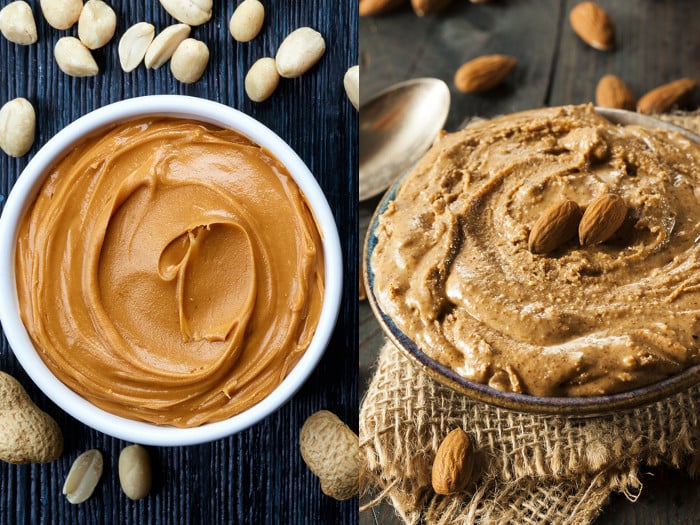Introduction to Almond Butter and Peanut Butter
Almond butter and peanut butter are both creamy spreads made from nuts. Almond butter is derived from almonds, while peanut butter is made from peanuts. They differ in taste, texture, and nutritional composition, leading some consumers to favor one over the other based on personal preference or dietary considerations.
Nutritional Comparison: Almond Butter vs. Peanut Butter
Let’s compare the nutritional profiles of almond butter and peanut butter:
Almond Butter (Per 2 Tablespoons)
- Calories: 196
- Protein: 7 grams
- Fat: 18 grams (mostly monounsaturated)
- Carbohydrates: 6 grams
- Fiber: 3 grams
- Vitamin E: 7.3 mg (37% DV)
- Magnesium: 96 mg (24% DV)
Peanut Butter (Per 2 Tablespoons)
- Calories: 191
- Protein: 7 grams
- Fat: 16 grams (mostly monounsaturated and polyunsaturated)
- Carbohydrates: 7 grams
- Fiber: 3 grams
- Vitamin E: 2.9 mg (15% DV)
- Magnesium: 49 mg (12% DV)
Health Benefits of Almond Butter
Rich in Monounsaturated Fats
Almond butter is high in monounsaturated fats, which are heart-healthy and can help reduce the risk of cardiovascular disease.
Excellent Source of Vitamin E
Almond butter is a significant source of vitamin E, a powerful antioxidant that helps protect cells from damage caused by free radicals.
Low in Carbohydrates
For those following a low-carb or ketogenic diet, almond butter can be a suitable option due to its relatively low carbohydrate content.
Health Benefits of Peanut Butter
Rich in Protein
Peanut butter is a good source of plant-based protein, which is essential for building and repairing tissues in the body.
High in Healthy Fats
While lower in monounsaturated fats compared to almond butter, peanut butter contains a good balance of healthy fats, including omega-6 fatty acids.
Contains Resveratrol
Peanut butter contains resveratrol, a compound with antioxidant and anti-inflammatory properties that may offer various health benefits.
Potential Downsides of Almond Butter and Peanut Butter
Allergies
Both almond butter and peanut butter can trigger allergic reactions in individuals with nut allergies. Cross-contamination is also a concern in facilities processing both almonds and peanuts.
Added Ingredients
Some commercially available nut butters may contain added sugars, hydrogenated oils, or other additives that can negate their health benefits. Always check the ingredient list when purchasing nut butter.
Choosing the Right Nut Butter for You
When choosing between almond butter and peanut butter, consider your dietary preferences, nutritional needs, and any potential allergies. Both options offer health benefits, so the best choice ultimately depends on individual factors.
FAQs
Is almond butter healthier than peanut butter?
Both almond butter and peanut butter offer health benefits and can be part of a balanced diet. The choice between the two depends on personal preferences and nutritional needs.
Can almond butter be substituted for peanut butter in recipes?
Yes, almond butter can often be used as a substitute for peanut butter in recipes, although it may alter the flavor and texture slightly.
Is almond butter lower in carbs than peanut butter?
Yes, almond butter generally contains fewer carbohydrates than peanut butter, making it a suitable option for those following low-carb diets.
Which nut butter is better for weight loss?
Both almond butter and peanut butter can be included in a weight loss diet in moderation, as they are high in healthy fats and protein, which can help keep you feeling full and satisfied.
Are there any other nut butters besides almond and peanut?
Yes, there are several other nut and seed butters available, including cashew butter, walnut butter, and sunflower seed butter, each with its own unique flavor and nutritional profile.
Can I make my own almond butter or peanut butter at home?
Yes, homemade almond butter and peanut butter can be easily made by blending roasted almonds or peanuts in a food processor until smooth.
Can I give almond or peanut butter to my dog?
While both almond and peanut butter are safe for dogs in moderation, it’s essential to choose varieties without added sugars, salt, or xylitol, which can be toxic to dogs.
Conclusion
Almond butter and peanut butter are both nutritious spreads that offer health benefits and can be enjoyed in various ways. Whether you prefer the rich, creamy taste of almond butter or the classic flavor of peanut butter, incorporating either into your diet can provide essential nutrients and delicious flavor. Ultimately, the choice between the two comes down to personal preference, dietary restrictions, and nutritional needs.
- Top 12 Foods That Are High in Phosphorus - April 23, 2024
- Almond Butter vs. Peanut Butter: What Healthiest? - April 23, 2024
- The 14 Best Gluten-Free Flours - April 23, 2024


